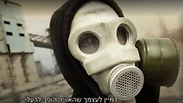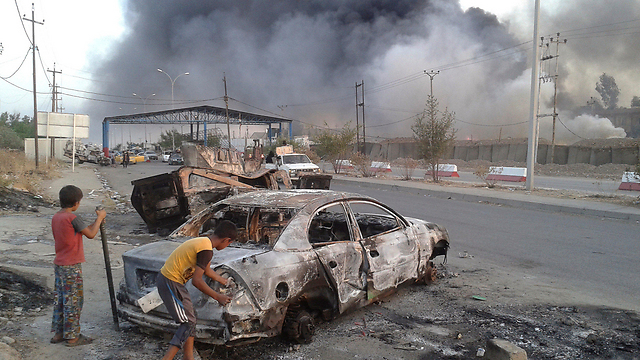
When it comes to chemical weapons, the region is already running wild
Chemical warfare has become a routine in the Middle East
Analysis: Israel is facing a situation in which its potential enemies – radical Islamic states or organizations – have turned chemical weapons into legitimate warfare.
James Clapper, the American director of national intelligence, relayed a public strategic warning to countries in the Middle East last week: The United States is not really capable of influencing nuclear proliferation. We cannot help you against a nuclear enemy, and each country is on its own.

This message was relayed, between the lines, during a speech Clapper delivered at a research institute in New York, in which he announced that the attempt to get North Korea give up all its nuclear weapons was probably a “lost cause,” as he described it. He basically said that the US had come to terms with nuclear weapons in North Korea. State Department officials realized the meaning of the comments, and rushed to declare that the US was determined to denuclearize the Korean peninsula – but does anyone believe them?

Chemical attack in Mosul, Iraq. The Middle East is returning to the nonconventional race, and Israel is beginning to anxiously prepare for the new era (Photo: Reuters) (צילום: רויטרס)
Senior Israeli officials still remember how American presidents explained to them a decade ago that North Korea would never have a nuclear weapon. Today, the nuclear agreement with Iran is a replica of the North Korean nuclear affair, and as far as Israel is concerned, Clapper’s statement marks the resumption of the nonconventional arms race in the Middle East.
Defense establishment officials assess that as soon as the banking restrictions on Iran are lifted, it will start breaking the nuclear agreement. All eyes are on three countries: Saudi Arabia, Egypt and Turkey. Egypt and Turkey, to make sure that they won't let a Shia power get a nuclear weapon, and Saudi Arabia, which has already purchased the rights for a nuclear bomb from Pakistan. The Middle East is returning to a nonconventional arms race, and Israel is beginning to anxiously prepare for th new era.
When it comes to chemical weapons, the region is already running wild. In late October 2012, the world was shocked to learn that 129 innocent people had choked to death after Russian Special Forces pumped a chemical agent into a Moscow theater’s ventilation system while fighting Chechen terrorists who had taken over the building. This lethal substance is routinely used by the Russian military today, while the Syrian government accuses the rebels of using chemical agents – as it should.
In the Arabic media, there is a dispute over who poisoned 35 residents in Aleppo’s al-Hamdaniya neighborhood several days ago: The rebels claim that the Syrian air force dropped toxic barrel bombs, while the Syrian regime says the rebels are the ones who fired toxic shells. A committee appointed by the United Nations Security Council to investigate the use of chemical weapons reported in late august that chemical weapons in the fighting in Syria had spread, and a report by the UN’s Organisation for the Prohibition of Chemical Weapons determined in October that the Syrian government was still carrying out attacks with toxic gas.
Chemical weapons are also threatening to spread into Iraq. Last week, the American press published pictures of American soldiers, south of Mosul, wearing gas masks. The fear that ISIS will use chemical agents during the battle for Mosul is not theoretical: Evidence of mustard gas was found in one of the villages they controlled in the area, and according to intelligence organizations in the West, one of the ISIS commanders in the city is a soldier who served in the chemical units in Saddam Hussein’s army.
And so chemical warfare has become something of a routine in the Middle East, and the world powers’ deterrence component against local elements that are obtaining chemical agents or using them has been erased. This deterrence reached its peak in 2013, when the American administration threatened to attack the Assad regime should it continue to attack its citizens with chemical means, but today this American determination no longer exists. The cooperation with the Russians has collapsed too, and there is no longer a world power controlling the area.
The final result is that Israel is facing a situation in which its potential enemies – radical Islamic states or organizations – have turned chemical weapons into legitimate warfare.










